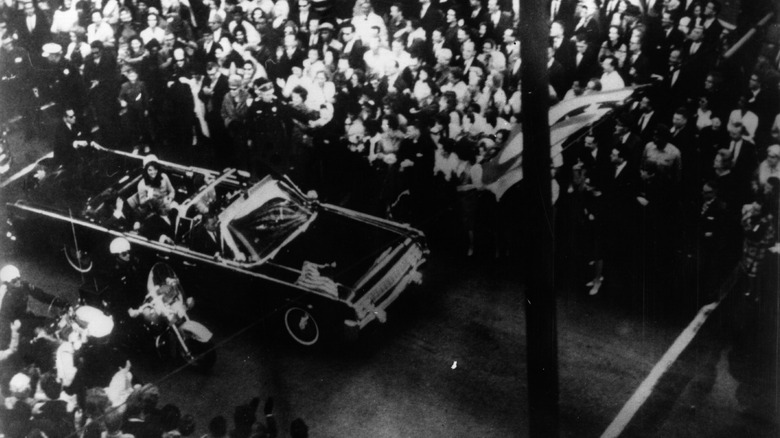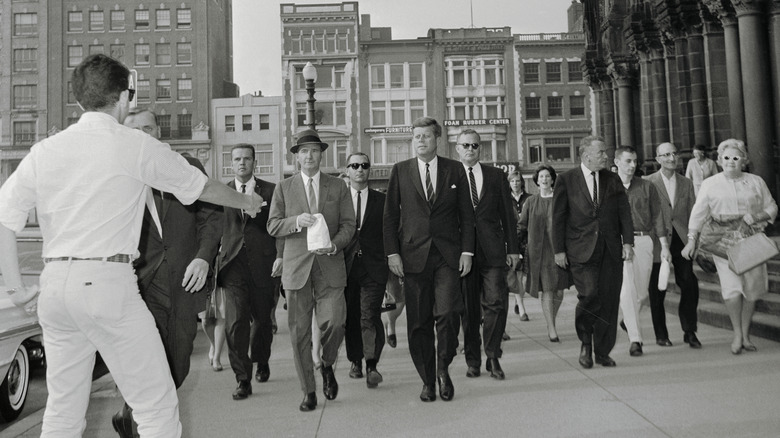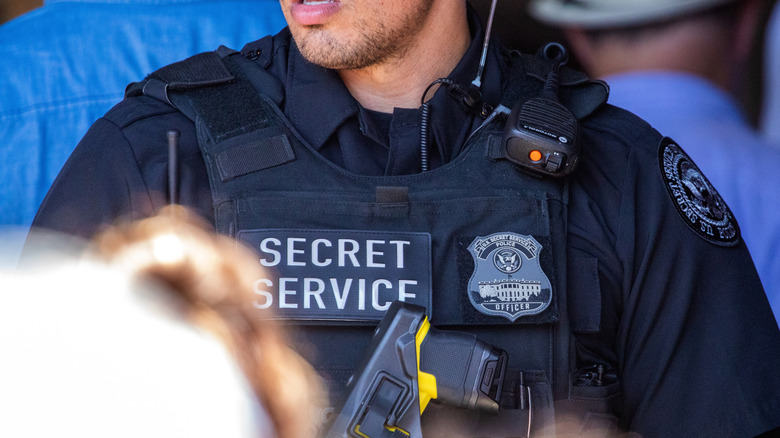The Secret Service Detail That Doesn't Make Sense About JFK's Assassination
The assassination of President John F. Kennedy as his motorcade traveled through Dealey Plaza in Dallas, Texas, on November 22, 1963, is perhaps one of the most discussed, analyzed, and controversial moments in American history. Kennedy was hit by two bullets — the first went through his back and exited his neck, and the second went in and out of his skull, killing him. The Warren Report into the attack concluded that the shot had been fired by lone assassin Lee Harvey Oswald from an upper floor of the nearby Texas Book Depository. Oswald himself was later murdered by gunman Jack Ruby while being transported by police.
The killing has been the subject of an incredible amount of conjecture and several prominent conspiracy theories regarding who was really behind it. Some have speculated the mafia or Soviet involvement, but there is evidence to believe that the reason for the disaster was much closer to home. As reported by numerous outlets and described in the memoirs of those who were entrusted with ensuring Kennedy's safety, the assassination could be described as a major failing of the president's security detail, which barely reacted in those crucial seconds after the president was first struck.
The macho culture of the Secret Service was likely a factor
The Secret Service is a federal agency with responsibilities that include the 24-hour-a-day presence of Secret Service agents wherever the president might be. Indeed, agents are expected to put their bodies on the line in the event of an attack to ensure the head of state's safety and react to an attack instantly. But the truth is that on the day of the JFK assassination, the agents around the president at the time of the assassination failed to react to the first shot, barely moving from their positions and leaving the president fatally exposed. Five seconds later, Kennedy had been hit again, this time fatally.
As reported by Vanity Fair back in 2014, a growing body of evidence shows that nine of the 28 agents charged with protecting Kennedy's motorcade had been out late the night before — and were possibly hungover and sleep deprived. And this wasn't just a one-off. Apparently, a culture of late-night drinking and partying existed within the ranks of the Secret Service, perhaps a very 1960s expression of the agency's supposed macho image. Those in charge were reportedly warned that such a culture undermined reaction times and increased the chances of a disaster, but to no avail.
Abraham Bolden is acknowledged as the first Black agent to be enlisted in the Secret Service. A junior at the time of Kennedy's assassination, he wrote in his memoir, "The Echo from Dealey Plaza," that he was horrified by the lackadaisical approach many in the Secret Service had toward their vital duties to protect the leader of the free world. "The senior agents struck me as arrogant and overconfident ... [their] cocksure attitudes governed right up to the moment of Kennedy's death," Bolden wrote.
The Secret Service has continued to attract criticism for debauchery
In the wake of the JFK assassination, testimony from the upper echelons of the Secret Service argued that no agents were in any way undermined by a revelrous culture within the agency. But journalists investigating the tragedy soon suggested that the partying of the administration seems to have infected the agency during the Kennedy years. Indeed, some have suggested that certain personnel were even having liaisons with members of Kennedy's extended family — a possible sign that professionalism was at a low ebb in the months before his assassination.
One might have thought that potentially being at fault for such a disaster would forever change the permissive culture of the Secret Service. Yet news reports down the years commenting on the sheer number of scandals the agency has been involved in demonstrate that there is still arguably a culture issue. In 2012, a group of agents dubbed the "Dirty Dozen" was sent home from a detail in Colombia after reportedly indulging in heavy drinking and interactions with sex workers. In 2015, a government watchdog concluded that two agents involved in a collision at the White House were likely impaired.
And lapses in security continue. The 2024 presidential election campaign was dominated by the attempted assassination of Donald Trump by 20-year-old Thomas Crooks in July of that year as the Republican nominee held a rally near Butler, Pennsylvania. Crooks was able to fire eight rounds, killing one audience member and wounding two more, as well as Trump himself, grazing his ear with a bullet. The Secret Service has been fiercely criticized for a "cascade of failures" according to a 2025 Senate report, despite a lack of firings at the agency (via The Guardian).


